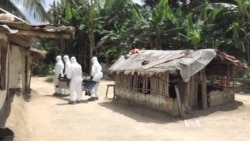ເລື້ອງລາວທີ່ເກີດຂຶ້ນຢູ່ທົ່ວໄປ ໃນນະຄອນຫລວງມອນໂຣເວຍ
ປະເທດໄລບີເຣຍ ກາຍມາເປັນເລື້ອງທຳມະດາໄປແລ້ວ ຄືຜູ້ປ່ວຍ
ທີ່ເປັນ ຍິງໄວໜຸ່ມຄົນນຶ່ງບໍ່ຍອມໄປໂຮງໝໍ ໃນເວລາພະນັກງານ
ແພດໄດ້ຂໍຮ້ອງໃຫ້ນາງໄປ ແລະຊຸມຊົນທັງໝົດ ກໍຢາກໃຫ້ນາງເຮັດ
ຕາມຄຳຂໍນັ້ນ. ດຽວນີ້ຜູ້ຍິງຄົນດັ່ງກ່າວ ແມ່ນເສຍຊີວິດແລ້ວ ແລະ
ຫຼາຍໆຄົນໃນຊຸມຊົນນັ້ນ ກໍໄດ້ຕິດເຊື້ອພະຍາດອີໂບລາ. ຜູ້ສື່ຂ່າວ
ວີໂອເອ Benno Muchler ໄດ້ຕິດຕາມຄະນະຝັງສົບ ຂອງທ້ອງ
ຖິ່ນຊຶ່ງໄດ້ນຳເອົາສົບ ຂອງຜູ້ຍິງຄົນດັ່ງກ່າວ ອອກໄປຈາກໝູ່ບ້ານ
ທີ່ຕັ້ງຢູ່ໃນເມືອງ Margibi ອັນເປັນເຂດນຶ່ງທີ່ໄດ້ຮັບຜົນກະທົບ
ຢ່າງໜັກ ໃນໄລບີເຣຍ ແລະໄດ້ຝັງສົບຂອງນາງ ໃນປ່າຊ້າຢູ່ໃກ້
ຄຽງນັ້ນ. ເປັນທີ່ໜ້າມະຫັດສະຈັນຫຼາຍ ຫຼັງຈາກທີ່ໄດ້ທຳການຝັງສົບ ຫຼາຍກວ່າ 200 ສົບ
ມາແລ້ວ ກໍບໍ່ມີຜູ້ໃດຢູ່ໃນຄະນະດັ່ງກ່າວ ຕິດພະຍາດອີໂບລາເລີຍ. Benno Muchler ມີ
ລາຍລະອຽດກ່ຽວກັບເລື້ອງນີ້ ຊຶ່ງໄຊຈະເລີນສຸກ ຈະນຳເອົາມາສະເໜີທ່ານ ໃນອັນດັບຕໍ່ໄປ.
ນ້ອງຊາຍຂອງແມ່ຍິງທີ່ເສຍຊີວິດຮ້ອງໄຫ້ອອກມາວ່າ “ໂອ້ຍ ໂອ້ຍ ໂອ້ຍ ເອີ້ ພວກເຮົາ
ມີຊີວິດໄດ້ແນວໃດ? ໂອ້ຍ ພວກເຮົາຈະຢູ່ກັນແນວໃດ?”
ຍິງຄົນນຶ່ງໄດ້ເສຍຊີວິດແລ້ວ. ນ້ອງຊາຍຂອງນາງ ເສຍໃຈຫຼາຍ. ຄະນະຝັງສົບທ້ອງຖິ່ນ
ພ້ອມແລ້ວ ທີ່ຈະນຳເອົາສົບອອກໄປຈາກໝູ່ບ້ານ ໃນເຂດຊຸມຊົນ Robertsfield ທີ່ຢູ່
ໃກ້ໆກັບເດີ່ນບິນສາກົນຂອງໄລບີເຣຍ.
ທ່ານ Emmanuel N.B. Flomo ທີ່ມີກ້ອງຖ່າຍວີດີໂອນ້ອຍໆ ແມ່ນ ເປັນຫົວໜ້າຄະນະ
ຝັງສົບນີ້. ການຍົກຍ້າຍສົບທີ່ຕິດແປດດ້ວຍພະຍາດ ອີໂບລາ ແມ່ນເປັນວຽກທີ່ມີຄວາມ
ສ່ຽງສູງ. ການຖ່າຍວີດີໂອນັ້ນ ກໍເປັນ ເລື້ອງທີ່ຫຍຸ້ງຍາກອັນນຶ່ງ.
ເຈົ້າບໍ່ສາມາດເຄື່ອນຍ້າຍໄດ້ຢ່າງວ່ອງໄວ ເວລາໃສ່ຊຸດຄືກັບພວກຜູ້ ຊາຍຄະນະຝັງສົບ
ເຫຼົ່ານັ້ນໃສ່ຢູ່. ເຄື່ອງຂອງຕ້ອງໄດ້ປົກຄຸມໄວ້ ແລະ ໄດ້ຖືກຂ້າເຊື້ອໂຣກຫຼັງຈາກນັ້ນ ຄືກັນ
ກັບທຸກໆສິ່ງ ໃນທົ່ວບໍລິເວນ ແຫ່ງນີ້. ພວກພະນັກງານເກັບກູ້ສົບເລີ້ມດ້ວຍ ລົດຂົນສົ່ງສົບ ແລະ ຕໍ່ຈາກນັ້ນ ກໍແມ່ນເຮືອນຂອງຜູ້ຍິງຄົນດັ່ງກ່າວ.
ທ່ານ Flomo ຫົວໜ້າຄະນະຝັງສົບເວົ້າວ່າ: “ພວກເຮົາຕ້ອງຂ້າເຊື້ອໂຣກ ຢູ່ໃນທຸກ
ສິ່ງທຸກຢ່າງ ເພາະວ່າພວກເຮົາຈະບໍ່ໄດ້ ໄປສຳພັດກັບ ມັນໂດຍຄວາມຜິດພາດ.
ຍ້ອນວ່າ ເຈົ້າບໍ່ຄວນທີ່ຈະໄປແຕະຕ້ອງກັບ ສິ່ງຕ່າງໆຢູ່ໃນທີ່ນີ້ ເພາະວ່າ…”
ຜູ້ສື່ຂ່າວວີໂອເອເວົ້າຂຶ້ນວ່າ: “ຊັ້ນວະ ແຕ່ ຂ້ອຍໝາຍຄວາມວ່າ ມັນບໍ່ເປັນຕາເຊື່ອ
ເລີຍ ພວກຄົນທັງໝົດເຫຼົ່ານັ້ນເດ້ ຄືວ່າ ພວກຜູ້ຊາຍ ຢູ່ອ້ອມແອ້ມພວກເຮົານີ້.
ພວກເຂົາເຈົ້າບໍ່ມີເຄື່ອງ ປົກປ້ອງໃດໆເລີຍ.” ທ່ານ Flomo ເວົ້າຕໍ່ໄປວ່າ: “ນັ້ນ
ແຫລະ ແມ່ນບັນຫາທີ່ພວກເຮົາມີ ຢູ່ໃນໄລບີເຣຍ. ພວກຄົນສ່ວນຫຼາຍ ເຂົາເຈົ້າ
ບໍ່ເຊື່ອວ່າ ເຊື້ອໄວຣັສ ແມ່ນເລື້ອງແທ້ຈິງ.”
ຍິງສາວທີ່ອາໄສຢູ່ໃນຕູບນ້ອຍຫຼັງນີ້ ທີ່ມີພຽງແຕ່ຕຽງນອນອັນດຽວ ໝໍ້ຄົວກິນ ແລະ ຟືນ
ຈຳນວນນຶ່ງ. ນາງໄດ້ນອນຢູ່ເທິງເສື່ອທີ່ວາງຢູ່ ກັບພື້ນ ແລະປົກຄຸມດ້ວຍກອງເຄື່ອງນຸ່ງ.
ທ່ານ Flomo ເວົ້າຕໍ່ໄປວ່າ: “ລາວກຳລັງຂ້າເຊື້ອໂຣກທີ່ຢູ່ຕາມສົບ. ແລະຂ້ອຍເຂົ້າ
ໃຈວ່າ ນາງມີລູກນ້ອຍຄົນນຶ່ງ ແລະລູກນ້ອຍຂອງນາງ ມີອາຍຸພຽງສາມເດືອນ.
ສະນັ້ນ ຂ້ອຍບໍ່ຮູ້ວ່າ ຖ້າຄອບຄົວຂອງນາງຍັງ ຈະປະຕິເສດ ບໍ່ຍອມຮັບເອົາລູກ
ເດັກນ້ອຍໄປຮັບການຮັກສາອີກຫຼືບໍ່ ເພາະວ່າ ຂ້ອຍຮູ້ຈັກວ່າເດັກນ້ອຍ ບໍ່ກິນ
ຫຍັງເລີຍດຽວນີ້.”
ຫຼັງຈາກໄດ້ຂ້າເຊື້ອໂຣກຕາມສົບແລ້ວ ພວກເກັບກູ້ສົບແມ່ນກຽມພ້ອມ ທີ່ຈະນຳເອົາສົບ
ໃສ່ເຂົ້າໄປໃນຖົງສົບ.
ທ່ານ Flomo ເວົ້າວ່າ: “ແລະຢູ່ຈຸດນີ້ເປັນຕອນທີ່ມີຄວາມສ່ຽງສູງ. ສະນັ້ນ ມັນເປັນ
ເວລາດຽວເທົ່ານັ້ນ ທີ່ອາດຈະຕ້ອງໄດ້ຈັບສົບ ແລະນັ້ນແມ່ນການຍົກເອົາສົບຂຶ້ນ
ຈາກພື້ນ ໃສ່ເຂົ້າໄປໃນຖົງສົບໂດຍກົງ. ນັ້ນແມ່ນເວລາດຽວ ເທົ່ານັ້ນ ທີ່ພວກ
ພະນັກງານພວກເກັບສົບ ຈະໄດ້ສຳພັດກັບສົບ. ເຊື້ອພະຍາດທີ່ຕິດແປດຢູ່ອ້ອມ
ສົບນັ້ນ ຂ້ອຍອາດເວົ້າໄດ້ວ່າ ແມ່ນມີ 100 ເປີເຊັນ.”
ໃນຂະນະທີ່ພວກພະນັກງານ ກຳລັງຂ້າເຊື້ອໂຣກນອກຊຸດເຂົາເຈົ້າຢູ່ນັ້ນ ພໍ່ຂອງເດັກນ້ອຍ
ຮ້ອງໃສ່ເຂົາເຈົ້າຕ່າງໆນາໆ. ສາມີຂອງຜູ້ຍິງທີ່ເສຍຊີວິດ ພຽງແຕ່ສາມາດເບິ່ງ ພວກພະ
ນັກງານຫາມສົບ ພັນລະຍາຂອງລາວອອກໄປ.
ຄະນະຝັງສົບ ໄດ້ນຳເອົາສົບໄປທີ່ໝູ່ບ້ານຢູ່ໃກ້ຄຽງ. ພວກພະນັກງານເກັບກູ້ສົບ ໄດ້ຝັງສົບ ຜູ້ຍິງຄົນນັ້ນ ຢູ່ຫ່າງໄກອອກໄປ ໃນປ່າແຫ່ງນຶ່ງ.
ຫຼັງຈາກທີ່ໄດ້ຝັງສົບ ຫຼາຍກວ່າ 200 ສົບມາແລ້ວ ນັບຕັ້ງແຕ່ມີການ ລະບາດຂອງພະຍາດ
ອີໂບລາ ໃນບໍລິເວນເຂດຂອງເຂົາເຈົ້າ ບໍ່ມີຜູ້ໃດເລີຍຢູ່ໃນຄະນະຝັງສົບ ໄດ້ລົ້ມປ່ວຍ.
ວຽກງານຂອງພວກເຂົາເຈົ້າ ບໍ່ພຽງແຕ່ມີຄວາມສ່ຽງທາງດ້ານສຸຂະພາບ ເທົ່ານັ້ນ. ມັນຍັງມີ
ຄວາມເຄັ່ງຕຶງດ້ານຄວາມຮູ້ສຶກອີກດ້ວຍ. ຍ້ອນເປັນການເຄົາລົບ ຕໍ່ຜູ້ຍິງທີ່ເສຍຊີວິດ ແລະ ຄອບຄົວຂອງນາງ ເຂົາເຈົ້າບໍ່ຢາກໃຫ້ຂ້າພະເຈົ້າຖ່າຍວີດີໂອ ກ່ຽວກັບວິທີເອົາສົບຂອງນາງລົງສູ່ຂຸມຝັງສົບ.
ພວກພະນັກງານກ່າວວ່າ ເຂົາເຈົ້າບໍ່ຢ້ານເລີຍ. ເຂົາເຈົ້າຈຳເປັນຕ້ອງເຮັດວຽກນັ້ນ. ເພາະວ່າ ຖ້າເຂົາເຈົ້າບໍ່ເຮັດແລ້ວ ປະຊາຊົນໃນເຂດດັ່ງກ່າວ ກໍຈະຕິດ ແລະ ຕາຍຍ້ອນພະຍາດ ອີໂບລາ ອີກຫຼາຍຂຶ້ນ.
The story is becoming all too common in Monrovia. A sick young woman refused to go to the hospital when health workers asked her, and the entire community, to do so. Now, the woman is dead and many of the community are infected with Ebola. Benno Muchler accompanied the local burial team who removed the woman's body from the village in Margibi County -- one of the worst affected areas in Liberia -- and buried it in a nearby graveyard. Amazingly after more than 200 such burials none of the team has become infected.
"Oh, oh, oh. Yes. How we living? Oh. How gotta we living?"
A woman died. Her brother is heartbroken. A local burial team is getting ready to remove the body from the village, in the Robertsfield community, near Liberia's International Airport.
Emmanuel N.B. Flomo, the man with the little camera, is the head of the team.
Removing dead bodies infected with Ebola is a risky job. Filming it is a difficult one.
You can't move quickly in a suit like these men are wearing. The gear needs to be covered and later disinfected, like everything else around here. The undertakers start with the hearse and then take on the woman's house.
"We have to disinfect everything, so that we don't mistakenly get in contact with it. Because you're not supposed to get in touch with anything in there because …"
"So, but I mean it's crazy. All the people like, the guys around us. They have no protection at all."
"That's the problem we got in Liberia. Most people, they're not believing that the virus is real."
The young woman lived in this tiny hut -- with just a bed, some cooking pots, some firewood. She lies on a mattress on the floor and is covered by clothes.
"He's disinfecting the body. And it's my understanding that she's a baby mother and the child is just three months old. // So I don't know if the family will still be refusing to take the baby for treatment because I learned the child is not eating right now."
After disinfecting the body, the undertakers are preparing themselves to put the body into the body bag.
"And this point is the risky part. So, it's only possible to touch the body one time and that is by taking the body from the ground, straight into the body bag. That's the only time the guys will get in contact with the body. The infection around this body is, I would say 100 percent."
While the men are disinfecting themselves, the father shouts at them. The husband can only watch how the undertakers are carrying his dead wife away.
The burial team takes the body to a nearby village. The undertakers bury the body far into the bush.
After more than 200 burials since the Ebola outbreak in their area, none of the team has gotten sick.
But their job not only comes with a health risk. It's also an emotional strain. Out of respect for the dead woman and her family, they don't want me to film how they have to put the body into the ground.
The men say they're not scared. They need to do it. Because if they didn't, more of their people would get infected and die.
(( Benno Muchler, VOA News, Margibi County, Liberia ))






